
Bophuthatswana, officially the Republic of Bophuthatswana, and colloquially referred to as the Bop, was a Bantustan that was declared (nominally) independent by the apartheid regime of South Africa in 1977. However, like the other Bantustans of Ciskei, Transkei and Venda, its independence was not recognized by any country other than South Africa.

Zenzile Miriam Makeba, nicknamed Mama Africa, was a South African singer, songwriter, actress, and civil rights activist. Associated with musical genres including Afropop, jazz, and world music, she was an advocate against apartheid and white-minority government in South Africa.
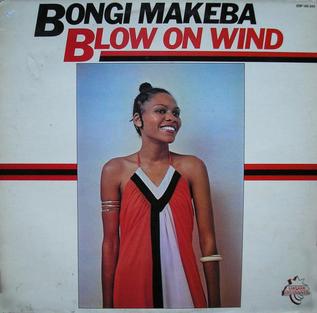
Bongi Makeba was a South African singer-songwriter. She was the only child of singer Miriam Makeba with her first husband, James Kubay.
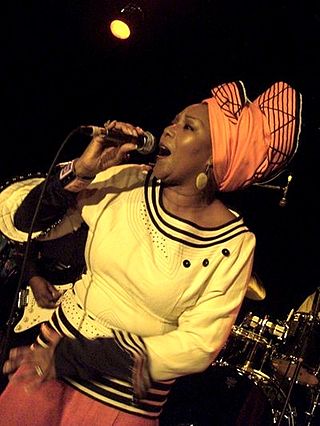
Lorraine Klaasen is a London, Ontario-based world music singer. Her mother was South African jazz singer Thandi Klaasen. She has performed at the Montreal International Jazz Festival, and her international itinerary has included the United States, Mexico and the Caribbean. She and her mother were also reputed to be two of Nelson Mandela's favorite musicians.
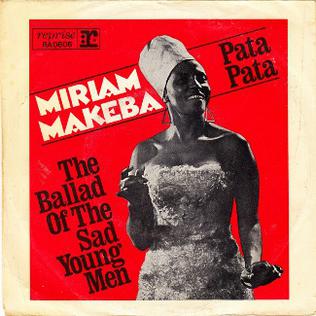
"Pata Pata" is an Afro-pop dance song popularized internationally by South African singer Miriam Makeba. "Pata Pata" is credited to Makeba and Jerry Ragovoy. Her most popular recording of "Pata Pata" was recorded and released in the United States in 1967. The song is considered by many to be Makeba's signature hit and it has since been recorded by many artists.
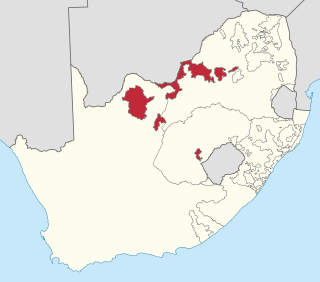
The 1994 Bophuthatswana crisis was a major political crisis which began after Lucas Mangope, the president of Bophuthatswana, a nominally independent South African bantustan created under apartheid, attempted to crush widespread labour unrest and popular demonstrations demanding the incorporation of the territory into South Africa pending non-racial elections later that year. Violent protests immediately broke out following President Mangope's announcement on 7 March that Bophuthatswana would boycott the South African general elections. This was escalated by the arrival of right-wing Afrikaner militias seeking to preserve the Mangope government. The predominantly black Bophuthatswana Defence Force and police refused to cooperate with the white extremists and mutinied, then forced the Afrikaner militias to leave Bophuthatswana. The South African military entered Bophuthatswana and restored order on 12 March.
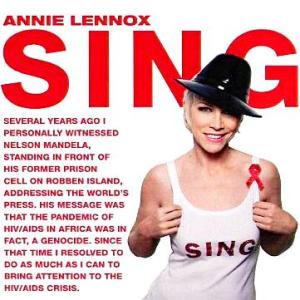
"Sing" is a song recorded by Scottish singer Annie Lennox for her fourth solo studio album, Songs of Mass Destruction (2007). It was released as the second single from the album on 1 December 2007 by RCA Records. Lennox was inspired to write the track after seeing South African activist Zackie Achmat at Nelson Mandela's 46664 HIV/AIDS concert. She wanted the track to be a source of empowerment for people without a voice of their own. It also gave rise to her SING Campaign which aimed to raise funds and awareness for issues surrounding HIV/AIDS. "Sing" was produced by Glen Ballard and interpolates the South African tune "Jikelele"; the music was given to Lennox by an activist group called The Generics.

An Evening with Belafonte/Makeba is a Grammy Award-winning 1965 album by Harry Belafonte and Miriam Makeba, released by RCA Victor. It was the second outcome of the long lasting collaboration between Belafonte and Makeba, the first being the appearance of Makeba in the song "One More Dance" on Belafonte's 1960 album, Belafonte Returns to Carnegie Hall.
Steve McEwan is a multi Grammy award-winning British songwriter, artist, and musician. His songs have been recorded by country music artists including Chris Stapleton, Kenny Chesney, Carrie Underwood, Faith Hill, and Keith Urban. Outside of country, he has also written with rock and pop stars such as Kylie Minogue, Roger Daltrey, David Archuleta, James Morrison, James Blunt, Jackson Browne, James Bay, and James Arthur as well as rapper Eminem. His song "Cry" with Jon Batiste won best American Roots song and Best Performance at the 2022 Grammys and he also won overall Best Album for "We Are". In 2024 he won the Grammy for Best Song For Social Change for "Refugee" with the artist K'naan.

Eyes on Tomorrow is an album by South African singer Miriam Makeba, released in 1991. It was recorded in South Africa. Dizzy Gillespie guested on the album.

Lerato Moipone Molapo, known professionally as Lira, is a South African singer. Her name translates to "love" in Sesotho and she speaks four languages. She is a multi-platinum selling and an 11-time South African Music Award (SAMA)-winning Afro-soul vocalist, who refers to her music as "a fusion of soul, funk, elements of jazz and African."
"Soweto Blues" is a protest song written by Hugh Masekela and performed by Miriam Makeba. The song is about the Soweto uprising that occurred in 1976, following the decision by the apartheid government of South Africa to make Afrikaans a medium of instruction at school. The uprising was forcefully put down by the police, leading to the death of between 176 and 700 people. The song was released in 1977 as part of Masekela's album You Told Your Mama Not to Worry. The song became a staple at Makeba's live concerts, and is considered a notable example of music in the movement against apartheid.
BOP Studios is a recording studio located in the outskirts of Mahikeng, South Africa. It was established in 1991 by the Sefalana Employee Benefits Organization, a government pension fund in the Republic of Bophuthatswana. Artists who have recorded there include Laura Branigan for her album Over My Heart, Brenda Fassie, Ladysmith Black Mambazo, Miriam Makeba, Stimela, and the Soweto String Quartet. The Lion King soundtrack was also recorded and produced at the studio.

The apartheid regime in South Africa began in 1948 and lasted until 1994. It involved a system of institutionalized racial segregation and white supremacy, and placed all political power in the hands of a white minority. Opposition to apartheid manifested in a variety of ways, including boycotts, non-violent protests, and armed resistance. Music played a large role in the movement against apartheid within South Africa, as well as in international opposition to apartheid. The impacts of songs opposing apartheid included raising awareness, generating support for the movement against apartheid, building unity within this movement, and "presenting an alternative vision of culture in a future democratic South Africa."
This is a discography of South African musician Miriam Makeba (1932–2008).

The Bophuthatswana Defence Force was established on 6 December 1977 from trainees of the South African Defence Force. It was the defence force of the Republic of Bophuthatswana, a nominally independent bantustan during the Apartheid era of South Africa.

Reflections is the 2004 final studio album of Miriam Makeba. It won three prizes at the South African Music Awards in 2004.

Keep Me in Mind is a 1970 album by Miriam Makeba.The album juxtaposes Makeba's own compositions, and one "Lumumba" by her daughter Bongi, with songs by Stephen Stills, Van Morrison, Lennon-McCartney and John Fogerty.
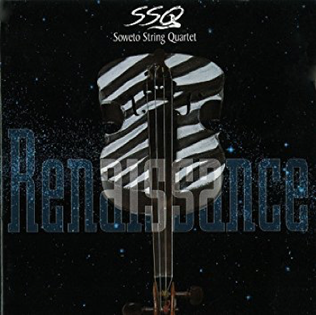
Renaissance is the second studio album by the South African quartet the Soweto String Quartet, released in October 1996 by BMG Records. It follows the national and international success of their debut album Zebra Crossing (1994), and was produced by Grahame Beggs. As with their previous album, Renaissance blends classical music with African pop and folk music, while also exploring new textures, with styles on the album including marabi, kwela and worldbeat. Quartet member Reuben Khemse described the album's themes as reawakening, revival and the dawn of new eras.

No Borders is the forty-fourth and final studio album by South African jazz trumpeter Hugh Masekela. The album was released on 11 November 2016 via Universal Music label.















